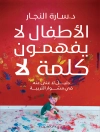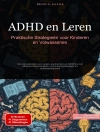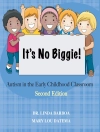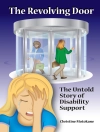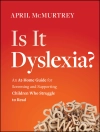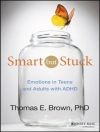Essential advice and resources for helping kids with
dyslexia
The Dyslexia Checklist is a valuable guide for parents
and teachers that can help them better understand children and
teenagers with dyslexia and other reading- and language-based
disabilities. The book relays the most current research available
and is filled with practical strategies, supports, and
interventions. Using these tools teachers and parents can
accommodate the needs and strengthen the skills of students with
reading and writing disabilities across all age levels. The book is
presented in a simple, concise, easy-to-read checklist format and
is filled with useful advice and information on a wide range of
topics.
* Explains what we now know about dyslexia from decades of
research
* Contains games to strengthen a child’s literacy and language
skills
* Provides important information for hooking in reluctant and
struggling readers
* Offers suggestions for enhancing skills in vocabulary,
comprehension, composition and written expression, spelling, math,
and more
The book also provides information on the educational rights of
students with dyslexia.
Inhaltsverzeichnis
Acknowledgments xiii
About the Authors xv
Introduction xvii
1. Basic information on dyslexia 1
Introduction 2
1.1. Clarifying the Terms Dyslexia and Learning Disabilities 3
1.2. Important Facts and General Information About Dyslexia 7
1.3. Signs and Symptoms of Dyslexia 11
1.4. Decades of Research: What We Now Know About Dyslexia 16
1.5. Other Common Problems 20
1.6. Common Strengths and Positive Characteristics of People with Dyslexia 25
1.7. Diagnosing Dyslexia 27
1.8. Research-Based Intervention Programs for Struggling Readers 35
1.9. What Children with Dyslexia Need from Parents and Teachers 43
1.10. Key Instructional Components and Interventions for Students with Dyslexia 45
1.11. Dual or Multiple Exceptionalities (Gifted and Dyslexic) 50
Resources 54
2. Strategies for helping with reading, language, and writing 57
Introduction 58
2.1. Phonological Awareness 59
2.2. Systematic Phonics 67
2.3. Decoding Strategies 73
2.4. Sight Word and Irregular Word Strategies 86
2.5. Fluency Strategies 91
2.6. Vocabulary Strategies 98
2.7. Comprehension Strategies 104
2.8. Spelling 115
2.9. Common Writing Difficulties for Children with Dyslexia 126
2.10. Strategies to Help with Prewriting: Planning and Organizing 129
2.11. Strategies for Teaching Composition and Written Expression 133
2.12. Strategies to Help with Revising and Editing 140
2.13. Assistive Technology to Support Reading and Writing 146
2.14. Accommodating Reading and Writing Difficulties 154
2.15. Games and Activities to Strengthen Literacy and Language Skills 159
2.16. The Basic Spelling Vocabulary List 163
Resources 169
3. Checklists for parents 177
Introduction 177
3.1. Talking with Your Child About Dyslexia and Other Learning Differences 178
3.2. How to Advocate for Your Child 182
3.3. Finding a Tutor or Educational Therapist 187
3.4. Building and Nurturing Your Child’s Self-Esteem 191
3.5. How to Help Your Child with Homework 195
3.6. Reinforcing Reading Skills at Home 201
3.7. Helping Your Child with Organization and Time Management 206
3.8. Strategies for Building Your Child’s Study Skills 213
Resources 218
4. Checklists for teachers 221
Introduction 221
4.1. Adaptations, Accommodations, and Modifications: What’s the Difference? 222
4.2. How Teachers Can Help Students with Homework 226
4.3. Differentiating Instruction 232
4.4. Adaptations and Modifications of Materials 237
4.5. Adaptations and Accommodations in Testing 240
4.6. Helping Students with Organization and Time Management 246
4.7. Strategies to Aid Memory 253
4.8. Strategies for Teaching Reading in the Content Areas 258
Resources 263
5. Other important checklists for parents and teachers 265
Introduction 265
5.1. High School Students with Dyslexia 266
5.2. College Students with Dyslexia 270
5.3. Response to Intervention 274
5.4. Special Education 282
5.5. Individualized Education Plans 287
5.6. Section 504 290
5.7 National Organizations and Resources That Address Disability Issues 294
Resources 298
Index 303
Über den Autor
Sandra F. Rief, M.A., is an internationally known speaker,
consultant, and best-selling author of books on helping children
with learning disabilities and ADHD. A former award-winning special
educator, she is author or co-author of nunerous books including
How to Reach and Teach All Children in the Inclusive
Classroom and the ADHD Checklist. Find more information
at her website, href=’http://www.sandrarief.com/’>www.sandrarief.com.
Judith M. Stern, M.A., is a teacher, educational
consultant, and national speaker, who specializes in helping
children with learning and attention problems. Her past books
include Putting on the Brakes: Understanding and Taking Control
of Your ADD or ADHD. For her consulting, presentation, and
tutoring topics, visit her website, href=’http://www.judithsterneducationalconsultant.com/’>www.Judith Stern Educational Consultant.com.


